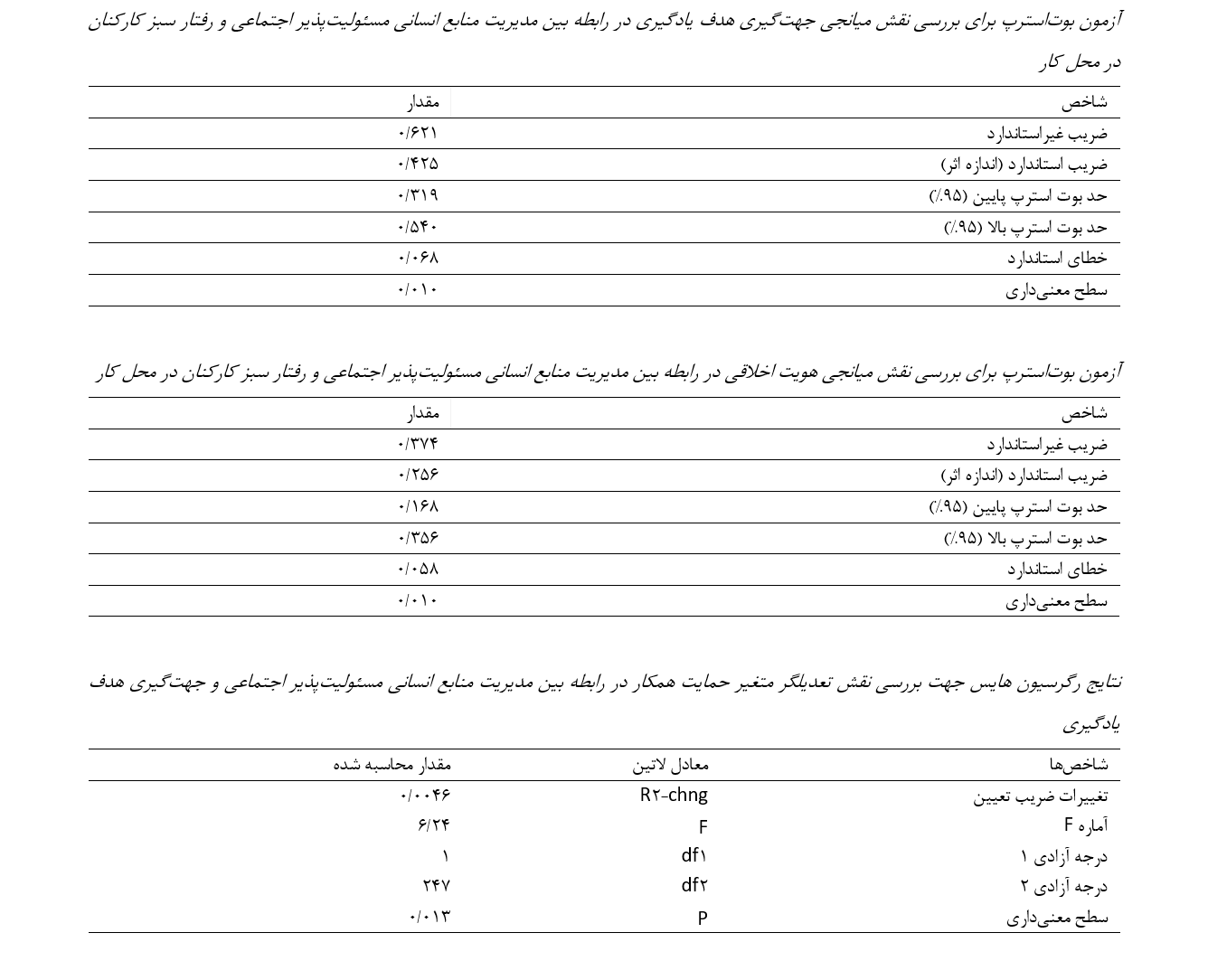بررسی نقش میانجی جهتگیری هدف یادگیری در رابطه بین سیاستهای منابع انسانی سبز و عملکرد زیستمحیطی
کلمات کلیدی:
مدیریت منابع انسانی مسئولیتپذیر اجتماعی, رفتار سبز, جهتگیری هدف یادگیری, هویت اخلاقی, حمایت همکارچکیده
هدف این پژوهش بررسی تأثیر مدیریت منابع انسانی مسئولیتپذیر اجتماعی بر رفتار سبز کارکنان با در نظر گرفتن نقش میانجی جهتگیری هدف یادگیری و هویت اخلاقی و نقش تعدیلگر حمایت همکاران در میان کارکنان شرکتهای بیمه در کرمانشاه بود. این پژوهش کمی از نوع همبستگی با رویکرد مدلسازی معادلات ساختاری انجام شد. جامعه آماری شامل 290 نفر از کارکنان شرکتهای بیمه در شهر کرمانشاه بود که بهصورت سرشماری انتخاب شدند. برای گردآوری دادهها از پرسشنامه ششسؤالی اورلیتسکی و سوانسون برای مدیریت منابع انسانی مسئولیتپذیر اجتماعی، پرسشنامه ششسؤالی بیسینگ-اولسون برای رفتار سبز، پرسشنامه چهارسؤالی سیرز و همکاران برای حمایت همکار، پرسشنامه پنجسؤالی آکوئینو و رید برای هویت اخلاقی و پرسشنامه هشتسؤالی باتن و همکاران برای جهتگیری هدف یادگیری استفاده شد. دادهها با نرمافزار LISREL تحلیل شدند. نتایج مدل معادلات ساختاری نشان داد مدیریت منابع انسانی مسئولیتپذیر اجتماعی اثر مثبت و معناداری بر رفتار سبز دارد (ضریب مسیر = 0.621، p < 0.01). همچنین، نقش میانجی جهتگیری هدف یادگیری (اثر غیرمستقیم = 0.425، p = 0.010) و هویت اخلاقی (اثر غیرمستقیم = 0.256، p = 0.010) تأیید شد. حمایت همکار نیز رابطه بین مدیریت منابع انسانی مسئولیتپذیر اجتماعی و جهتگیری هدف یادگیری (ΔR² = 0.0046، p = 0.0131) و هویت اخلاقی (ΔR² = 0.0125، p = 0.0009) را تعدیل کرد. مدیریت منابع انسانی مسئولیتپذیر اجتماعی میتواند از طریق ارتقای انگیزش یادگیری و درونیسازی ارزشهای اخلاقی و همچنین در بستر حمایت اجتماعی، رفتارهای سبز داوطلبانه کارکنان را ترویج کند و از این طریق به بهبود پایداری و رقابتپذیری سازمان کمک نماید.
دانلودها
مراجع
Ahmed, M., Zehou, S., Raza, S. A., Qureshi, M. A., & Yousufi, S. Q. (2020). Impact of CSR and environmental triggers on employee green behavior: The mediating effect of employee well‐being. Corporate Social Responsibility and Environmental Management, 27(5), 2225-2239. https://doi.org/10.1002/csr.1960
Akbari, P., Dehghani Zadeh, M., & Panahi, M. (2022). The impact of organizational ambidexterity on green entrepreneurial orientation and environmental performance, emphasizing the moderating role of perceived corporate social responsibility. Sustainable Human Resource Management, 4(7), 281-263. https://shrm.journals.umz.ac.ir/article_4106.html?lang=en
Beidat, S. M., Al Bakri, A. A., & Elbanna, S. (2020). Leveraging "green" human resource practices to enable environmental and organizational performance: Evidence from the Qatari oil and gas industry. Journal of Business Ethics, 164(2), 371-388. https://doi.org/10.1007/s10551-018-4075-z
Daud, S. R. (2023). Leadership Style That Influences Employees’ Green Behavior: A Literature Review. International Journal of Academic Research in Economics and Management Sciences, 12(3). https://doi.org/10.6007/ijarems/v12-i3/18950
Fawehinmi, O., Yusliza, M. Y., Kasim, W. Z. W., Mohamad, Z., & Muhammad Abi Sofian Abdul, H. (2020). Exploring the Interplay of Green Human Resource Management, Employee Green Behavior, and Personal Moral Norms. Sage Open, 10(4). https://doi.org/10.1177/2158244020982292
Mohabbi, A., Hamzavi, H., Khademi, A. e., & Kameli, M. J. (2023). The Impact of Green Human Resource Management on Social Responsibility in Educational Organizations: Mediating Role of Green Behavior of Employees. University Management, 2(2), 97-122. https://jam.uok.ac.ir/article_62868.html
Mughal, M. F., Cai, S., & Faraz, N. A. (2024). Green servant leadership and employees’ workplace green behavior: interplay of green self-efficacy, green work engagement, and environmental passion. Curr Psychol, 43, 26806-26822. https://doi.org/10.1007/s12144-024-06320-x
Rahimi Asl, R., Shirvani, A., & Soltani, I. (2021). Presenting and teaching the model of goal-oriented and ethical organization in the public sector (Case study: Employees of Isfahan and Chaharmahal and Bakhtiari Tax Affairs Organization). Political Sociology of Iran, 4(3). https://doi.org/10.30510/psi.2022.302154.2217
Rahimi, Y., Rangriz, H., & Fatemi, A. (2021). Designing a human resource organization model with an environmental (green) ethics approach in Iranian government organizations. Journal of Ethics in Science and Technology, 16(1), 79-86. https://www.magiran.com/paper/2635937/designing-a-model-for-organizing-human-resources-with-the-approach-of-environmental-ethics-green-in-iranian-government-organizations?lang=en
Ramezani, M., Ghodrati, A., SangiNourpour, A., Bohlouli, N., & Alavi Matin, Y. (2022). A Meta-Analysis of the Impact of Corporate Social Responsibility (CSR) on Human Resource Performance: The Moderating Role of Organizational Culture, Employee Gender, and Age. Green Management Quarterly, 2(1), 1-25. https://www.magiran.com/paper/2608847/meta-analysis-of-corporate-social-responsibility-csr-research-on-the-performance-of-human-resources-considering-the-moderating-role-of-organizational-culture-gender-and-employees-age?lang=en
Shah, P., Singh Dubey, R., Rai, S., Renwick, D. W., & Misra, S. (2024). Green human resource management: A comprehensive investigation using bibliometric analysis. Corporate Social Responsibility and Environmental Management, 31(1), 31-53. https://doi.org/10.1002/csr.2589
Tangestani, I., Nematollahi, H. R., & Arman, M. (2022). Investigating corporate social responsibility and employees' functional performance; explaining the mediating role of green behavior and green human resource management in petrochemical companies operating in the South Pars region. Journal of Human Resource Management, 18-14. https://doi.org/10.52547/JABM.3.2.56
Veerasamy, U., Joseph, M. S., & Parayitam, S. (2024). Green human resource management and employee green behaviour: participation and involvement, and training and development as moderators. South Asian Journal of Human Resources Management, 11(2), 277-309. https://doi.org/10.1177/23220937221144361
Wang, W., Fu, Y., Qiu, H., Moore, J. H., & Wang, Z. (2017). Corporate Social Responsibility and Employee Outcomes: A Moderated Mediation Model of Organizational Identification and Moral Identity. Frontiers in psychology, 8. https://doi.org/10.3389/fpsyg.2017.01906
Zhao, F., Kusi, M., Chen, Y., Hu, W., Ahmed, F., & Sukamani, D. (2021). Influencing Mechanism of Green Human Resource Management and Corporate Social Responsibility on Organizational Sustainable Performance. Sustainability, 13(16), 8875. https://doi.org/10.3390/su13168875
Zhou, Q., & Zheng, X. (2024). Socially responsible human resource management and employee green behavior at work: the role of learning goal orientation and moral identity. The International Journal of Human Resource Management, 35(1), 1-35. https://doi.org/10.1080/09585192.2023.2192358
Zihan, W., Makhbul, Z. K. M., & Alam, S. S. (2024). Green human resource management in practice: Assessing the impact of readiness and corporate social responsibility on organizational change. Sustainability, 16(3), 1153. https://doi.org/10.3390/su16031153

دانلود
چاپ شده
ارسال
بازنگری
پذیرش
شماره
نوع مقاله
مجوز
حق نشر 1403 Kamran Nazari

این پروژه تحت مجوز بین المللی Creative Commons Attribution-NonCommercial 4.0 می باشد.










